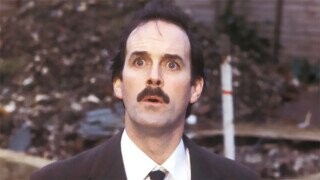‘Fawlty Towers’ Creator John Cleese Really Doesn’t Understand ‘Fawlty Towers’

John Cleese is a busy guy these days. In addition to appearing in an awkward Australian comedy roast, feuding with fellow Monty Python members on social media and canceling his own cancel culture show, he still somehow found the time to adapt his classic TV comedy Fawlty Towers, weaving together three episodes of the series for a new London stage show.
Ostensibly to promote the production (which initially debuted in Australia), Cleese recently penned a lengthy article for the U.K.’s Daily Telegraph in which, oddly, Cleese goes out of his way to defend the character of Basil Fawlty.
This article not your thing? Try these...
Cleese describes how the original series was about a “small-c conservative who dislikes change,” and is endlessly frustrated by an evolving culture. It’s true, the whole joke of Fawlty Towers is that Basil is a prudish, boot-licking colonial dinosaur; a pitiful toady for the type of traditional English society that was very much in the rearview by 1975.
Cleese then goes on to describe how, at the time, “everywhere you looked, revolution was afoot, from multiculturalism to feminism, and the England Basil lives in is no longer the country it was.” Which, again, is the joke. But then Cleese continues, “I sometimes feel this about England, too. When I look at our country today I yearn for a return to what seemed to be a happier, friendlier, calmer, more ironic culture. I remember an England where everyone was extremely polite, when people were doing their best, and when life seemed relatively simple.”
It probably goes without saying that the “polite” England that Cleese is yearning for here may not have been so “simple” and happy for everybody. Cleese is flat-out admitting that Basil felt threatened by women’s rights and racial equality, and then tries to argue that he had a point? And what does Cleese find so disagreeable about modern society? The “proliferation of call centres” and “trans women being allowed to compete in female sports.”
Cleese says that Basil would be “bewildered” by the world today. Ummm, that’s a good thing? This is a guy who was also bewildered by unmarried couples sharing a hotel room and the existence of a Black physician!
Cleese coming to the conclusion that Basil’s bigoted qualities are actually pretty relatable, now that the star is in the transphobic octogenarian assclown phase of his career, may seem surprising to some fans. Kind of like if Anthony Hopkins were to sample human flesh and publicly proclaim that Hannibal Lecter was really just a misunderstood gourmet. But this actually makes total sense for Cleese.
Remember, Cleese was not the only star of Fawlty Towers. It was written by Cleese and his then-wife Connie Booth, who also played Basil’s employee Polly, the character that Cleese now calls the show’s “voice of sanity.” By the way, Cleese didn’t even bother to inform Booth about his ill-conceived Fawlty Towers reboot.
Booth once revealed that Cleese and Basil were very much intertwined, telling an interviewer, “John’s, sort of, so much Basil, parts of him … and of his father. … It was familiar to both of us.”
Meanwhile, comedian Tim Brooke-Taylor noted that the show “managed to combine John’s failings into the character (of Basil),” crediting Booth who “knew John better than anybody else.” Brooke-Taylor even recalled that Cleese would treat “Italian waiters just like Manuel,” the frequently-abused Spanish server, and he was “really seething when they got something wrong.”
An additional wrinkle to all this is that, during the writing of Fawlty Towers, Cleese and Booth were in the process of splitting up, which may explain why Basil came to embody so many negative aspects of Cleese’s personality. “We were able to get out a lot of our frustrations with each other through those characters,” Booth later admitted. “It was kind of like therapy.”
So it’s not that John Cleese is becoming Basil Fawlty, so much as he was always Basil Fawlty — even if he didn’t fully realize it until now.
You (yes, you) should follow JM on Twitter (if it still exists by the time you’re reading this).
